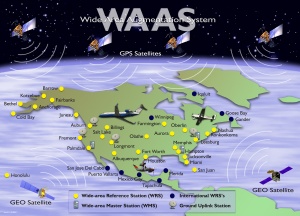If you wish to contribute or participate in the discussions about articles you are invited to contact the Editor
WAAS Ground Segment
| WAAS | |
|---|---|
| Title | WAAS Ground Segment |
| Author(s) | GMV. |
| Level | Basic |
| Year of Publication | 2011 |
The Wide Area Augmentation System (WAAS) is an GPS Augmentation system developed by the Federal Aviation Administration (FAA), with the goal of improving its accuracy, integrity, and availability. Essentially, WAAS is intended to enable aircraft to rely on GPS for all phases of flight, including precision approaches to any airport within its coverage area.
WAAS uses a network of ground-based reference stations, in North America and Hawaii, to measure small variations in the GPS satellites' signals in the western hemisphere. Measurements from the reference stations are routed to master stations, which queue the received Deviation Correction (DC) and send the correction messages to geostationary WAAS satellites in a timely manner (every 5 seconds or better). Those satellites broadcast the correction messages back to Earth, where WAAS-enabled GPS receivers use the corrections while computing their positions to improve accuracy.[1]
WAAS Ground Segment
The WAAS Ground Segment is composed of multiple Wide-area Reference Stations (WRS). These precisely surveyed ground stations monitor and collect information on the GPS signals, then send their data to three Wide-area Master Stations (WMS) using a terrestrial communications network. The reference stations also monitor signals from WAAS geostationary satellites, providing integrity information regarding them as well. As of October 2008 there were 38 WRSes: twenty in the contiguous United States (CONUS), seven in Alaska, one in Hawaii, one in Puerto Rico, five in Mexico, and four in Canada.[2]
Using the data from the WRS sites, the WMSes generate two different sets of corrections: fast and slow. The fast corrections are for errors which are changing rapidly and primarily concern the GPS satellites' instantaneous positions and clock errors. These corrections are considered user position-independent, which means they can be applied instantly by any receiver inside the WAAS broadcast footprint. The slow corrections include long-term ephemeric and clock error estimates, as well as ionospheric delay information. WAAS supplies delay corrections for a number of points (organized in a grid pattern) across the WAAS service area.
Once these correction messages are generated, the WMSes send them to two pairs of Ground Uplink Stations (GUS), which then transmit to satellites in the Space segment for rebroadcast to the User segment.
List of reference stations
Each FAA Air Route Traffic Control Center in the 50 states has a WAAS reference station, except for Indianapolis. There are also stations positioned in Canada, Mexico and Puerto Rico.[2] Listed below are the coordinates of the site centroids in North America:
| City | ICAO airport code | Location | Elevation |
|---|---|---|---|
| Bethel, Alaska | PABE | 60.787898226ºN 161.841705626ºW | 52.202 m |
| Billings, Montana | KBIL | 45.803726761ºN 108.539727967ºW | 1112.261 m |
| Barrow, Alaska | PABR | 71.282786134ºN 156.789914977ºW | 15.581 m |
| Cold Bay, Alaska | PACD | 55.200376531ºN 162.718528459ºW | 53.652 m |
| Fairbanks, Alaska | PAFA | 64.809686817ºN 147.847403468ºW | 149.888 m |
| Honolulu, Hawaii | PHNL | 21.312783159ºN 157.920876933ºW | 24.922 m |
| Juneau, Alaska | PAJN | 58.362530123ºN 134.585495176ºW | 16.024 m |
| Mérida, Yucatán (Mexico) | MMMD | 20.931919004ºN 89.662872977ºW | 29.157 m |
| Mexico City (Mexico) | MMMX | 19.431653193ºN 99.068389463ºW | 2236.638 m |
| Puerto Vallarta, Jalisco (Mexico) | MMPR | 20.679034758ºN 105.249200735ºW | 11.077 m |
| San José del Cabo, Baja California (Mexico)]] | MMSD | 23.160416093ºN 109.717667886ºW | 104.286 m |
| Tapachula, Chiapas (Mexico) | MMTP | 14.791340027ºN 92.367991216ºW | 54.922 m |
| Kotzebue, Alaska | PAOT | 66.887352636ºN 162.611355542ºW | 10.911 m |
| Iqaluit, Nunavut | CYFB | 63.731446844ºN 68.543393603ºW | 9.998 m |
| Gander, Newfoundland and Labrador | CYQX | Template:Coord | 146.891 m |
| Winnipeg, Manitoba | CYWG | Template:Coord | 222.046 m |
| Goose Bay, Newfoundland and Labrador | CYYR | Template:Coord | 37.842 m |
| Albuquerque, New Mexico | KZAB | Template:Coord | 1620.154 m |
| Anchorage, Alaska | PAZA | Template:Coord | 80.654 m |
| Aurora, Illinois | KZAU | Template:Coord | 195.922 m |
| Nashua, New Hampshire | KZBW | Template:Coord | 39.141 m |
| Leesburg, Virginia | KZDC | Template:Coord | 80.085 m |
| Longmont, Colorado | KZDV | Template:Coord | 1541.389 m |
| Fort Worth, Texas | KZFW | Template:Coord | 155.604 m |
| Houston, Texas | KZHU | Template:Coord | 10.947 m |
| Hilliard, Florida | KZJX | Template:Coord | 2.141 m |
| Olathe, Kansas | KZKC | Template:Coord | 305.814 m |
| Palmdale, California | KZLA | Template:Coord | 763.546 m |
| Salt Lake City, Utah | KZLC | Template:Coord | 1287.420 m |
| Miami, Florida | KZMA | Template:Coord | -7.882 m |
| Memphis, Tennessee | KZME | Template:Coord | 68.788 m |
| Farmington, Minnesota | KZMP | Template:Coord | 262.667 m |
| Ronkonkoma, New York | KZNY | Template:Coord | 6.108 m |
| Fremont, California | KZOA | Template:Coord | -3.459 m |
| Oberlin, Ohio | KZOB | Template:Coord | 224.115 m |
| Auburn, Washington | KZSE | Template:Coord | 82.128 m |
| San Juan, Puerto Rico | TJZS | Template:Coord | -28.547 m |
| Hampton, Georgia | KZTL | Template:Coord | 261.142 m |
Notes
References
- ^ WAAS in Wikipedia
- ^ a b WAAS and LAAS Status,FAA presentation at 47th meeting of the Civil Global Positioning System Service Interface Committee, September 25, 2008

